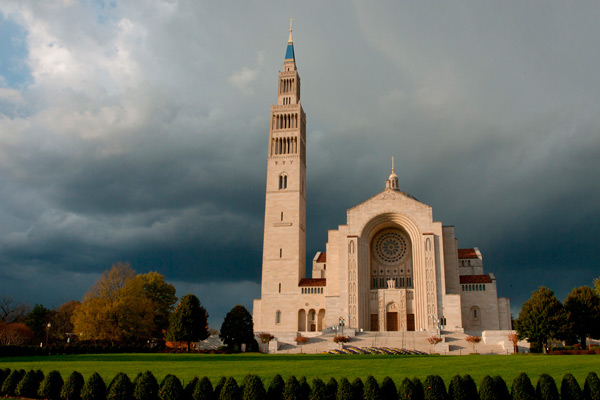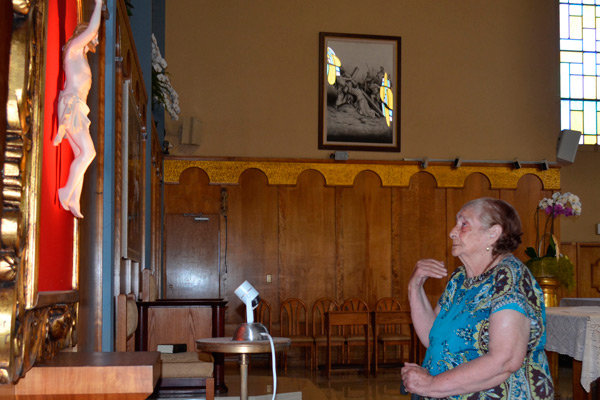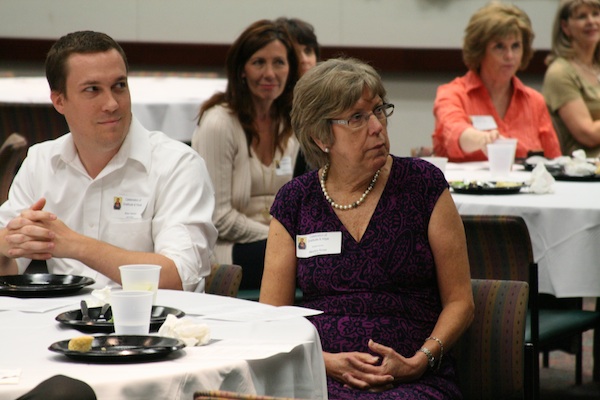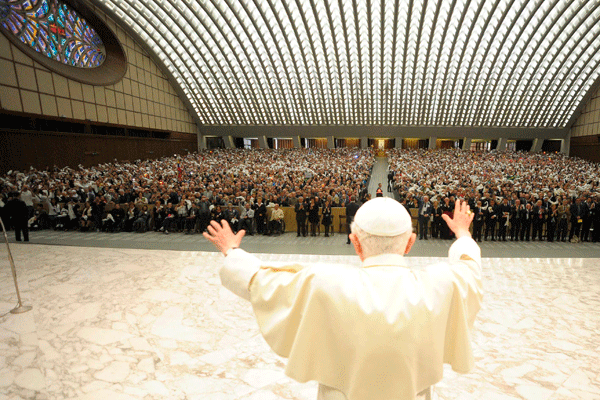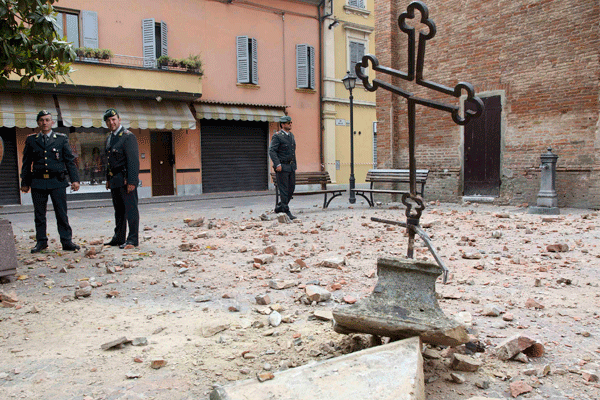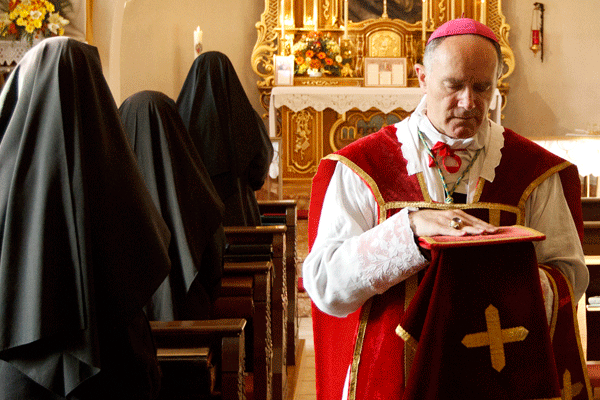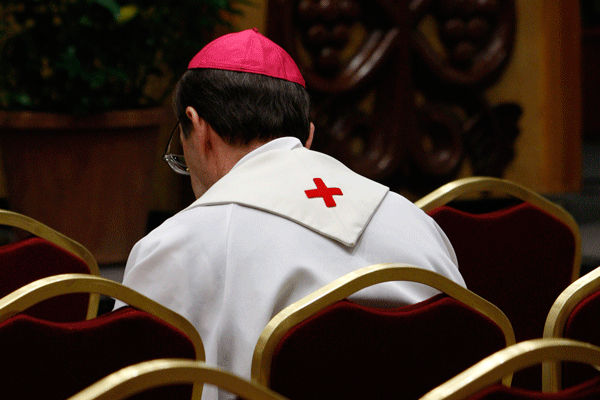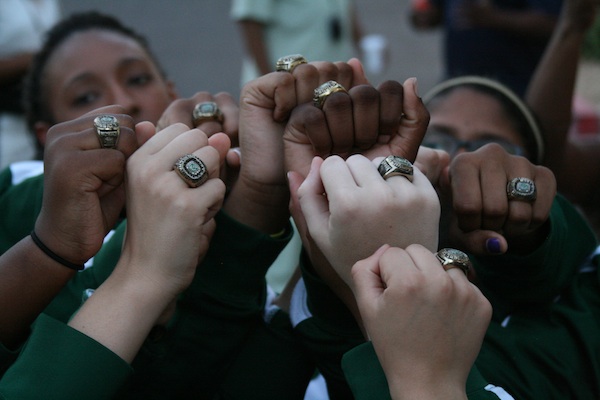
School ends for most Catholic campuses in the diocese this week. That hasn’t stopped many students from continuing to grow in the faith nor has it slowed down their achievements in academics, athletics or service.
Take a look at what they’ve accomplished in May:
Faith
- Club 13 — A new club at Bourgade Catholic High School, inducted 42 students as its first members. All of them have spent their entire lives (K-12) in Catholic school.
- Retreat — The eighth-grade class at Most Holy Trinity made their final retreat May 7-9. They stayed at Living Waters Retreat Center in Cornville and, according to a Facebook post, reflected on “why they are not ashamed to have a firm foundation in Christ before their journey into high school.” They were among many eighth-grade graduates who gathered in recent weeks for a final retreat together.
The Senior Threshold Retreat for Brophy grads drew 52 seniors. - Mary — Sacred Heart preschoolers in Prescott learned about science, nature and devotion to Mary earlier this month when they planted flowers in their new devotional garden (see page six of newsletter). Mary Tibshraeny of Scottsdale and Mr. and Mrs. Thomas Watson of Sun City donated the statue.
Academics
- International Science and Engineering Fair — Xavier sophomore Sarah Sakha won the Grand Prize at the Arizona Science and Engineering Fair (AZSEF), and captured 4th place in microbiology at the International Science and Engineering Fair. Her project involved the use of spice in the preservation of emergency food rations.
In other engineering news, Morgan Kelley, a senior at Xavier, won the Catholic Community Foundation’s Ralph M. Knight Chemistry and Engineering Scholarship. - First in Math — St. Theresa’s sixth-grade math class earned First place in state for First in Math Online Program. The students completed over four million online math problems competing peers statewide. It’s now a Million Sticker School, something that only 34 among more than 5,000 participating schools have earned.
Fifth grade has three of the top five First in Math players for the school: Matthew Villanueva, Zak Coleman and Connor White.
At Our Lady of Perpetual Help in Glendale, the students have solved 324,675 math problems. Six students already have over 3,000 virtual stickers and are mathematicians in the fun, instructional activity. - Honors — St. Mary’s High School inducted 27 students into the National Honor Society
- Student-produced video game — For students who want another shot at finishing the school year strong should check out “The Great Fitzgerald Hall,” a video game (PC users only) developed in class by Shannon Burke and Roxy DeAsis at Xavier College Preparatory. The game takes its Gator through the classrooms and corridors of Fitzgerald Hall, collecting objects along the way, until she finishes the school year in triumph.
In related news, Michelle Klein, a junior at Xavier, won an ward from ASU’s College of Technology and Innovation for her passion in the field. - Power of One commercial — Hector Salinas, a student at St. Mary’s High School, is featured in a commercial for Cox Charities’ Power of One Campaign.
- Biomedical Research — Brophy junior Tanner Tuohy received recognition from the Southwest Association for Education in Biomedical Research (SwAEBR’s) essay contest for Summer Research Internships. His essay, “Hits that Really Hurt,” was one of the 2012 honorees.
- Learning Chinese — Matthew Frankel, a sophomore at Brophy, earned a merit-based scholarship to study Mandarin Chinese this summer in China. The National Security Language Imitative for Youth is sponsored by the U.S. Department of State.
- New curriculum — Most Holy Trinity School will add Great Books to its reading curriculum in the fall. It combines outstanding literature with the Shared Inquiry method of learning to help develop higher-level critical thinking skills in reading, writing, speaking, and listening. These skills are very beneficial in all curriculum areas.
Athletics
- National champions — Bishop Thomas J. Olmsted presented the Lady Knights at St. Mary’s High School with their national championship rings last week. The varsity basketball team went undefeated in their season including national tournaments, and is ranked No. 1 in the nation. See highlight video.
- Wrestling goes national — Chase Frank, a junior at Brophy, won the AzWAY National Qualifier at 200 lbs and will be one of 14 wrestlers representing Arizona at the America’s Cup Western States Nationals over Memorial Day weekend. Thirty-five states are sending All-Star teams to this 3-day tournament. Coach Brad Frank, alongside Tim Berrier from Ironwood Ridge High School, have been asked to coach the Arizona team.
- Overall Excellence — Xavier College Preparatory received the H.A. Hendrickson Overall Excellence Award by the Arizona Interscholastic Association May 21. The award signifies that the all-girls institution has won more state championship, runner-up, and sectional titles than any co-ed or single-sex school in its conference (62 schools). Xavier won the same award in 2009.
- State champion — Nick Thomas a senior at Seton Catholic Preparatory High School in Chandler, and Nick Thorpe, a senior at Notre Dame Preparatory in Scottsdale, qualify for the national championships through USA Cycling. According to a Seton newsletter, Thomas is the 2012 State Champion in Mountain Biking for individuals aged 15-18 and will attend the USAA Cycling Development Camp at the Olympic Training Center in Colorado Springs, CO this summer.
Service
- Forty Under 40 — Kristin Parrack, Capital Campaign Coordinator at St. Francis Xavier and Best In Class Member, Ann-Marie Donaldson Alameddin were both announced as part of the Phoenix Business Journal’s Forty Under 40 program.
- Collections for poor, refugees — Our Lady of Perpetual Help students in Scottsdale are collecting shoes and socks all month for homeless guests at André House in Phoenix.
Eighth-graders at Sacred Heart in Prescott are collecting paper towels and toiletries through the end of the year for the Prescott Area Women’s Shelter. The school’s preschoolers raised more than $700 during a nearly 90-minute Trike-a-thon. The local Sheriff’s Office taught them bike safety.
The Girl Scouts at Most Holy Trinity recruited school students to help collect books, crayons and coloring books for Serrano Village Refugees. - Teachers We Love — Molly Woods, a sixth-grade math and social studies teacher at St. Theresa in east Phoenix, was selected as this month’s “Teachers We Love” by Arcadia News.
- Box tops — St. Theresa earned $745.38 in box tops through its latest campus collection. That was enough to purchase new playground balls.
Other
- Battle of the Books — Three St. John Bosco students took first place in various categories of the Regional/City Battle of the Books competition May 8 at Chandler Public Library. The competition was through a co-curricular activity at St. John Bosco in Ahwatukee. Each student read four books on their own to per round of competition. The “battle” tested each team’s comprehension.
- Social studies grants — Two Phoenix Catholic schools were among 13 schools that was awarded a social studies grant from SRP. St. Theresa earned $1,500 to purchase a Time for Kids subscription for kindergarten through sixth-grade. It Includes personal copies, digital editions and online access and will help school meet common core standard that says half of the reading curriculum be from informational text.
St. Jerome earned $1,500 to update Encyclopedia Britannica for library including an up-to-date presidential biography series. Students get research assignments and reports using these materials. The grant was awarded this past academic year and will expand next year. - Learning grant — Xavier College Preparatory was among 27 recipients of an SRP Learning grant. The school received nearly $4,700 for its Engineering Projects in Community Service program. This problem-based, service-learning model engages students in traditionally male-dominated fields of science, technology, engineering and math through real-world projects to improve the lives of others. Students complete projects for non-profit community organizations.
- Expansion — St. Thomas Aquinas in Avondale is opening a second fourth-grade classroom in August. This is a year earlier than planned.
- Xavier — 19 Xavier students were named National Honor Society for Dance Arts award recipients. Another 21 were induced into the International Thespian Society.
- Artsonia — Abi Arnold, a St. Theresa student, recently had her painting featured on Artsonia’s main web page slide show. The school regularly uploads projects which the public can vote on weekly.
Eighth grade paintings (largely landscape)
Self-portraits



